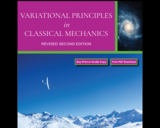
Two dramatically different philosophical approaches to classical mechanics were proposed during the 17th – 18th centuries. Newton developed his vectorial formulation that uses time-dependent differential equations of motion to relate vector observables like force and rate of change of momentum. Euler, Lagrange, Hamilton, and Jacobi, developed powerful alternative variational formulations based on the assumption that nature follows the principle of least action. These variational formulations now play a pivotal role in science and engineering.
This book introduces variational principles and their application to classical mechanics. The relative merits of the intuitive Newtonian vectorial formulation, and the more powerful variational formulations are compared. Applications to a wide variety of topics illustrate the intellectual beauty, remarkable power, and broad scope provided by use of variational principles in physics.
- Subject:
- Physical Science
- Physics
- Material Type:
- Textbook
- Provider:
- University of Rochester
- Author:
- Douglas Cline
- Date Added:
- 07/07/2021